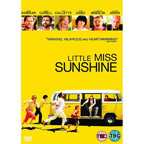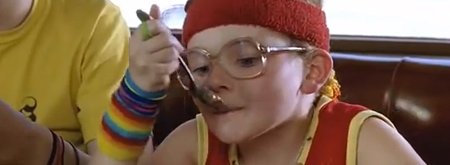Little Miss Sunshine
The Hoover family might not be dysfunctional if it wasn’t for the men in the house. Father, Richard (Greg Kinnear), is on the point of bankruptcy but has kept this morsel of information from his wife, Sheryl (Toni Collette). Richard is utterly obsessed with his ‘nine steps to winning’ programme, which he imagines will bring him fame and fortune once the book deal has been signed. Meanwhile, his audiences are found in primary schools.
Son Dwayne (Paul Dano) is wholeheartedly committed to the ideas of Nietzsche. As a result, he hates everything in the world and he has taken a vow of silence until he achieves his dream of training to be a fighter pilot. The third man in the house is Richard’s father (Alan Arkin) who has been evicted from his retirement home for being a drug addict. Grandpa is a foul-mouthed, grouchy old man who dotes on his young granddaughter Olive (Abigail Breslin). Into this mix comes Frank (Steve Carell), Sheryl’s brother who is a gay professor who believes himself to be the leading scholar on Proust. But when he loses out both in love and in a genius grant to his rival, Frank attempts suicide, and is later released into the care of Sheryl’s family.
Warning: This study guide contains plot spoilers
When plump, bespectacled Olive hears that she is to go to the final of the Little Miss Sunshine junior beauty pageant in California, the family sets off in their old VW bus for the two-day journey. Along the way, the van becomes increasingly unreliable, soon requiring the family to push-start it whenever they set off. When they stop off at a motel, Grandpa snorts some drugs, and cannot be woken up in the morning. He is rushed into hospital but is soon pronounced dead. However, the clock is ticking: Olive must get to Redondo Beach by 3pm if she is to enter. Since Grandpa had trained her in her talent routine, the others decide they should do their best to get her there. Grandpa’s body is bundled into the van and they race off in pursuit of Olive’s dream.
Background
When Michael Arndt’s screenplay for Little Miss Sunshine came into the hands of producers Marc Turtletaub, David T Friendly and Peter Saraf of Big Beach, they knew they had a winner. Friendly says, ‘I think there is only one other time in my entire life I had such a visceral reaction to a film as I did with this one. The feeling in my gut said that I had to make this movie. It's a very rare thing to find a film that really makes you laugh and then can turn around and make you cry like this one.’ They eventually handed the film to husband and wife directors Jonathan Dayton and Valerie Faris. This was their first feature film, having already made their name as directors of music videos and commercials.
Jonathan Dayton says, ‘A lot of people had come to us with style pieces, but we liked that Little Miss Sunshine felt very distant from that world. Sure, we wanted to do something with style, but we loved these characters and that was the most important thing. We wanted the experience to be drawn from what we love most in movies, one that celebrates human eccentricities.’ Valerie Faris agrees: ‘The story instantly struck a chord with us. We had always wanted to make a film that would ride a lot of tones; that would have a strong emotional life as well as lots of humour. We felt that Little Miss Sunshine was a story that shifts much in the same way that life shifts, moving from drama to farce to reflection and back to farce again.... Without all the things we loved about it – the raunchy language, the outrageous behaviour – it would have been the perfect family comedy. But we wanted to make a film not about family values, but about the value of family.’
Little Miss Sunshine has been a huge success for an independent film, wowing many critics. David Rooney, in Variety, praises it as, ‘A quietly antic dysfunctional family road trip comedy that shoots down the all-American culture of the winner and offers sweet redemption for losers – at least the ordinary folks often branded as such.’ Richard Schickel writes in Time Magazine that, ‘It comes closer to the truth about the way people really live – on the edge of fantasy-driven desperation – than our sanctimonies permit us to think.’ Little Miss Sunshine has been nominated for Best Original Screenplay in the 2007 Academy Awards; Alan Arkin and Abigail Breslin have also been nominated as Best Supporting Actor and Actress. However, not everyone is impressed. Peter Bradshaw in The Guardian laments that, ‘Each spike of satire is fitted with a safety-cap of feelgood reassurance.’
Official Little Miss Sunshine site
Questions for discussion
-
What did you enjoy about Little Miss Sunshine? What didn’t work for you? Do you think you would have enjoyed it more or less without the features that make it darker than a typical family comedy?
-
Little Miss Sunshine has been described as ‘an American family road comedy that shatters the mould.’ In what ways does it conform to the conventions of the road comedy genre, and in what ways does it subvert them?
-
‘I absolutely loved the script and also really loved this dysfunctional family who are just learning to get along for the first time. I got completely involved with them. Their frustrations and their yearnings felt very real to me and also quite universal. I found myself laughing and crying at the same time even as I read it.’ (Toni Collette)
How did you respond to the family? To what extent do you think their frustrations and yearnings are universal? Which members of the family did you particularly connect with? Why?
-
‘Family means everything to Sheryl. So she feels that she would do absolutely anything to smooth things over and make everyone happy – whatever that might take.’ (Toni Collette)
‘We wanted to make a film not about family values, but about the value of family.’ (Valerie Faris)
What does Little Miss Sunshine have to say about the value of family? Is Sheryl right to do whatever it takes to make everyone happy? What does it take for families to work?
-
‘There are two kinds of people in this world, winners and losers.’ (Richard)
Is Richard right? Which category do the members of the Hoover family fit into? How do you see yourself?
-
‘Now there's no sense in entering a contest if you don't think you're going to win. Do you think you can win Little Miss Sunshine?’ (Richard)
‘I don't want to be your family! I hate you people! I hate you! Divorce! Bankrupt! Suicide! You're losers!’ (Dwayne)
How do the various members of the family see success? Why are they all so obsessed with succeeding in their different ways? To what extent do you think they are an accurate reflection of western society? What does success mean for you?
-
‘A real loser isn't someone who doesn't win. A real loser is someone so afraid of not winning they don't even try.’ (Grandpa)
How is Grandpa’s definition of losers better than Richard’s? Do you think he is right? Why/why not? What difference should a relationship with God make to how one deals with failure?
-
What impact does Grandpa’s death have on the family? In what ways had he been both a positive and a negative influence on Olive?
-
Olive: Do you think there's a heaven?
Frank: Well, it's hard to say, Olive. I don't think anyone knows for sure.
Olive: I know, but what do you think?
Frank: Well ... erm ... er ...
Olive: I think there is.
Frank: Think I'll get in?
Olive: Yeah.
Frank: Promise?
Olive: Yeah.Why do you think many people want to hang on to the idea of heaven yet never give any thought to having a relationship with God (see John 5:24)?
-
How do the members of the family react when their dreams lie in ruins? What do they learn through these experiences?
-
‘Who is that? Nietzsche? So you stopped talking because of Friedrich Nietzsche? Far out.’ (Frank)
‘I think Dwayne's someone a lot of people will identify with right away. Everyone goes through a period where they don't really like their family, but you also know that you will always have some kind of bond with them. When you're fifteen, I think you start to lose your innocence and you see that these people around you are kind of crazy and you're not sure if you really want to participate in that, which is why Dwayne takes his vow of silence. But then when he finally cracks, when he's in his most vulnerable moment, his family is there for him and I think he's actually able to take that in.’ (Paul Dano)
What effect did Nietzsche’s thinking have on Dwayne? Why do you think these ideas often resonate so much with teenagers? In what ways does he grow up during the journey?
-
How did you react to the Little Miss Sunshine contest – and especially to Olive’s performance? In what ways is this a satirical reflection on the nature of children’s beauty pageants and on parents’ expectations of their children?
-
Dwayne: I wish I could just sleep until I was eighteen and skip all this crap – high school and everything – just skip it.
Frank: You know Marcel Proust?
Dwayne: He's the guy you teach.
Frank: Yeah. French writer. Total loser. Never had a real job. Unrequited love affairs. Gay. Spent twenty years writing a book almost no one reads. But he's also probably the greatest writer since Shakespeare. Anyway, he gets down to the end of his life, and he looks back and decides that all those years he suffered, those were the best years of his life, because they made him who he was. All those years he was happy? You know, total waste. Didn't learn a thing. So, if you sleep until you're eighteen . . . Ah, think of the suffering you're going to miss. I mean high school? High school! Those are your prime suffering years. You don't get better suffering than that.What truth is there in what Frank says? How have the family as a whole discovered this during their trip? How do you react to the idea that suffering can ultimately only be seen as redemptive within a Christian framework which understands that God is at work in and through suffering?
-
‘Every character in this story undergoes a major transformation – even the family's VW bus.’ (Producer Ron Yerxa)
How does the VW bus serve to help draw the family together? In what ways is its steady disintegration a metaphor for what is happening within the family? How are the family members transformed? In what ways has Olive been the one who has brought peace?
Unattributed quotes are from the film production notes.
 Film title: Little Miss Sunshine
Film title: Little Miss Sunshine
Director: Jonathan Dayton and Valerie Faris
Keywords: Success, failure, winners, losers, family, self-discovery, love
Screenplay: Michael Arndt
Starring: Toni Collette, Greg Kinnear, Alan Arkin, Steve Carell, Abigail Breslin, Paul Dano
Distributor: Fox Searchlight Pictures
Cinema Release Date: 2006
DVD Distributor: Twentieth Century Fox Home Entertainment
DVD Release date: 19 December 2006 (USA); 22 January 2007 (UK)
Certificate: 15 (UK); R (USA)
Buy Little Miss Sunshine from Amazon.co.uk or from Amazon.com
© 2007 Tony Watkins



